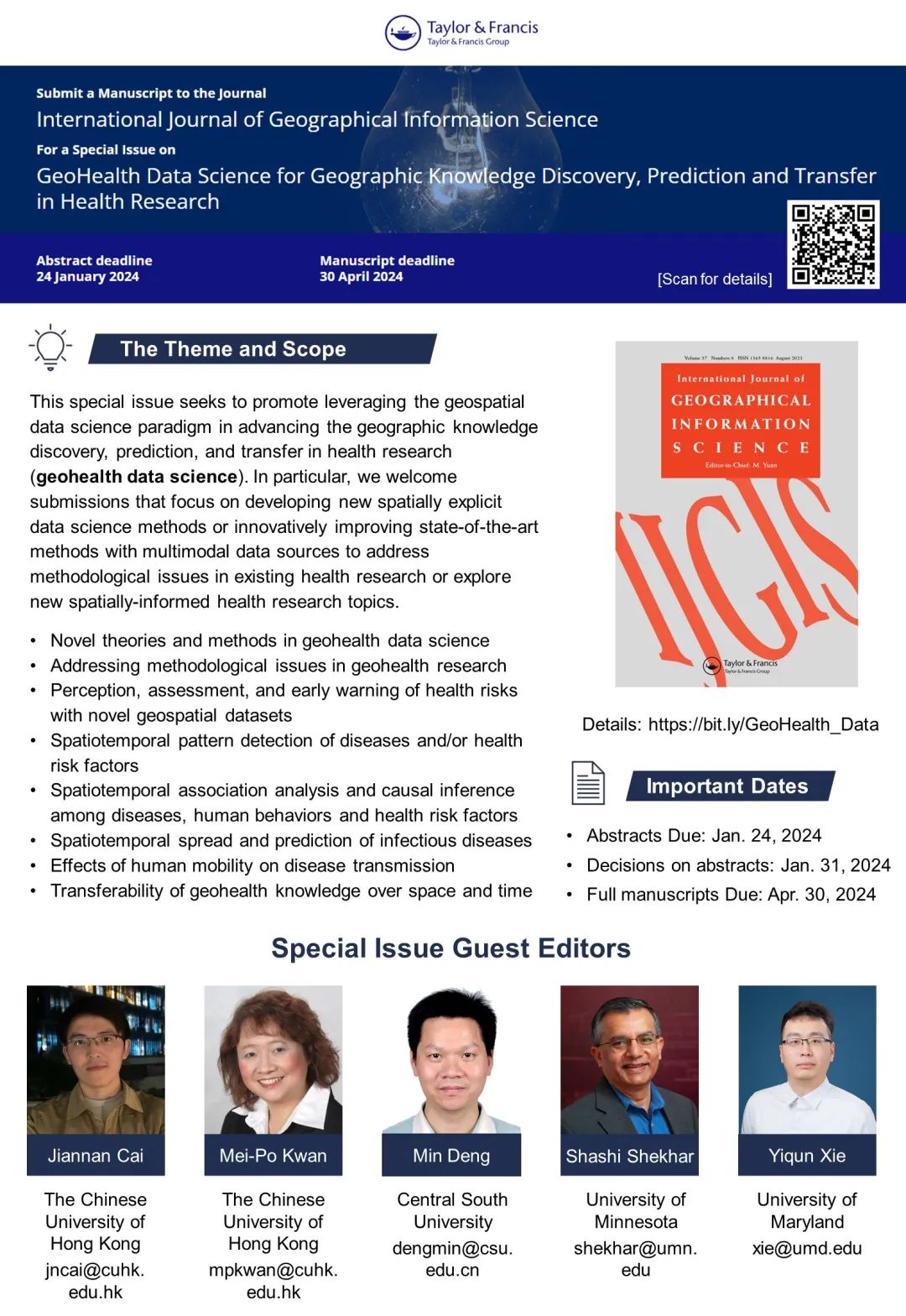
IJGIS Special Issue
GeoHealth Data Science for Geographic Knowledge Discovery, Prediction and Transfer in Health Research
Special Issue Editors
Jiannan Cai
The Chinese University of Hong Kong
jncai@cuhk.edu.hk
Mei-Po Kwan
The Chinese University of Hong Kong
mpkwan@cuhk.edu.hk
Min Deng
Central South University
dengmin@csu.edu.cn
Shashi Shekhar
University of Minnesota
shekhar@umn.edu
Yiqun Xie
University of Maryland
xie@umd.edu
Due to rapid advancements in location-aware technologies (e.g., global positioning system (GPS) trackers) and smart sensors (e.g., wearable environmental and biomedical sensors), we now have unprecedented access to vast amounts of highly accurate geospatial data relevant to human health and disease. These geospatial data promise new spatial insights into the health behaviors and outcomes of individuals, leading to a transformative shift towards spatially-informed health research. Meanwhile, the multimodal data sourced from different sensors also presents methodological challenges in health research due to the high heterogeneity of data in terms of spatial-temporal granularity, scale, structure, and semantics. The health data revolution thus calls for a geospatial data science paradigm to explore new forms of geographic knowledge underlying the complex formation and transmission processes of diseases and health risks, as well as their prediction and transfer involving space, time, and context.
The recent emerging geospatial data science techniques in artificial intelligence (GeoAI), machine learning, and data mining have demonstrated their ability to extract valuable geographic knowledge to support inferences and decision-making from geospatial big data. However, current health research largely applies existing data science methods without explicitly considering the unique characteristics of geospatial data (e.g., spatial autocorrelation and spatial heterogeneity). This oversight can limit or even bias health-related geographic understanding and undermine the effectiveness of health intervention policies. Furthermore, as human health and disease emerge as the intricate result of the interplay among human behaviors, natural environments, social contexts, and many other factors, the complex nature poses intrinsic methodological challenges and necessitates innovative geospatial data science methods.
This special issue seeks to promote leveraging the geospatial data science paradigm in advancing the geographic knowledge discovery, prediction, and transfer in health research (geohealth data science). In particular, we welcome submissions that focus on developing new spatially explicit data science methods or innovatively improving state-of-the-art methods with multimodal data sources to address methodological issues in existing health research or explore new spatially-informed health research topics.
Relevant Topics
-
Novel theories and methods in geohealth data science
-
Addressing methodological issues in geohealth research
-
Perception, assessment, and early warning of health risks with novel geospatial datasets
-
Spatiotemporal pattern detection of diseases and/or health risk factors
-
Spatiotemporal association analysis and causal inference among diseases, human behaviors and health risk factors
-
Spatiotemporal spread and prediction of infectious diseases
-
Effects of human mobility on disease transmission
-
Transferability of geohealth knowledge over space and time
Submission Procedure
This IJGIS special issue welcomes submissions by scholars from all disciplines. Interested authors should first submit a short abstract (250 words max) to Jiannan Cai (jncai@cuhk.edu.hk), Mei-Po Kwan (mpkwan@cuhk.edu.hk) and Yiqun Xie (xie@umd.edu) before January 24, 2024. Guest editors will review the submitted abstracts and evaluate whether the submissions fit the themes of this SI. Authors of abstracts with suitable topics will be invited to submit full manuscripts, while the invitation does not guarantee acceptance to the SI.
Full manuscripts, including any supporting materials, should be submitted using the journal’s submission portal by April 30, 2024, and the authors should specify this SI as the target during their submission. Guidelines for submission of full manuscripts can be found at: http://www.tandfonline.com/action/authorSubmission?journalCode=tgis20&page= instructions/. Please pay special attention to the required data and codes availability statement.
The International Journal of Geographical Information Science considers all manuscripts on the strict condition that they have been submitted only to the International Journal of Geographical Information Science, that they have not been published already, nor are they under consideration for publication or in press elsewhere. Authors who fail to adhere to this condition will be charged with all costs that the International Journal of Geographical Information Science incurs for their papers, and their papers will not be published. IJGIS exercises double-blinded peer reviews. Authors should only deposit anonymous manuscripts to online depositories. IJGIS cannot consider manuscripts with author information available online.
Important Dates
-
Abstracts (no more than 250 words) Due: Jan. 24, 2024
-
Decisions on abstracts: Jan. 31, 2024
-
Full manuscripts Due: Apr. 30, 2024




 ufabet
มีเกมให้เลือกเล่นมากมาย: เกมเดิมพันหลากหลาย ครบทุกค่ายดัง
ufabet
มีเกมให้เลือกเล่นมากมาย: เกมเดิมพันหลากหลาย ครบทุกค่ายดัง




